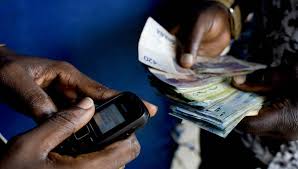The Ghana Revenue Authority has disclosed that the Electronic transfer levy (e-levy) is already raking in significant revenue for the country.
Head of Project Unit at GRA, Isaac Kwabena Amoako said collections from a single charging entity amounted to more than one million cedis in one day.
"The letters we sent to the charging entities were that, after every 48 hours, they should send us the Money. So our first Money should have come on Tuesday, but it didn’t come then we went to Wednesday and we saw some making attempts. So on Thursday, we went on our internal system [the Tax Application System] and we saw the invoices and we collated the invoices.
"As of the close of Thursday, we had had the invoice of a number of charging entities and one of the charging entities which owns more than 70% of the population had in excess of GH₵1million for just one day. So assuming all the others are not paying and this entity alone sends GH₵1million every day for 30 days. This means we are getting GH₵30million per month from just one charging entity.
Mr. Kwabena Amoako disclosed this on Joy FM's Super Morning Show, on Monday, May 9, while giving an update on the levy after a week of implementation.
The e-Levy is 1.5% on all electronic transfers.
It was rolled out by the Ghana Revenue Authority (GRA) on May 1, 2022, after the E-levy Bill was passed by Parliament and subsequently assented to by President Akufo-Addo.
The levy will apply to mobile money transfers done between accounts on the same electronic money issuer and mobile money transfers from an account on one electronic money issuer to a recipient on another electronic money issuer.
Others are; transfers from bank accounts to mobile money accounts and transfers from mobile money accounts to bank accounts
However, bank transfers on an instant pay digital platform or application originating from a bank account to an individual subject to a daily threshold, will be determined by the Minister of Finance.
The E-Levy was introduced by the government in the 2022 Budget on basic transactions related to digital payments and electronic platform transactions.
The rate would apply to electronic transactions that are more than GH¢100 daily. This is different from the percentage charged by some telecommunication companies on mobile money transfers.
Latest Stories
-
White House unveils plans for new $200m ballroom
1 hour -
US to deny visas to Palestinian officials
2 hours -
Royal reception for Women’s National Team: A tribute to Moroccan Women’s Football
2 hours -
King Mohammed VI orders emergency humanitarian and medical aid for Palestinians
2 hours -
JICA supports IFNA, ECOWAS to strengthen food security and nutrition in West Africa
2 hours -
Justin Timberlake reveals Lyme disease diagnosis
2 hours -
TECNO launches Ghana’s first and largest AI experience store
3 hours -
Underperformance in grants, petroleum receipts pose a threat to 2025 government revenue target – Deloitte
3 hours -
MMA fighter Conor McGregor loses appeal in civil rape case
3 hours -
Deloitte optimistic government will achieve 2025 GDP growth target of 4.0%
3 hours -
BoG urged to review its inflation targeting strategy
3 hours -
Zanzibar explores Zoomlion’s model as blueprint for sustainable waste management
3 hours -
Ghana must broaden bond market to withstand external shocks – Economist advises
4 hours -
GAF intensifies operations in Bawku and surrounding areas
4 hours -
Petrol price to go up; diesel and LGP to fall from August 1, 2025
4 hours

